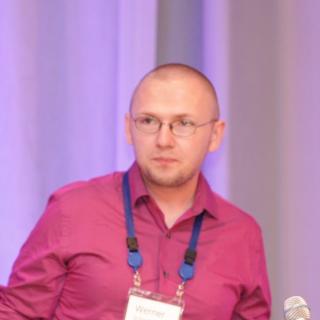Track: Modern CS In the Real World
Location:
- Seacliff A/B
Day of week:
- Tuesday
Computer Science research did not stop at QuickSort or the LR algorithm. In this track we'll cover topics such as probabilistic algorithms and data structures, new security and distributed algorithms, advances in typing, formal methods, new approaches to concurrency and much more. Why? Because we need to tackle ever more data in shorter periods of time - but our CPUs don't get much faster. Concurrency helps - but that just brings new problems to tackle, and meanwhile more moving parts just means more things that can fall over if we're not careful. Time to sneak a peek at approaches real companies use to tackle this issues using Computer Science research and results from the last few decades.

by Terence Parr
Creator of Antlr and ALL(*)
For decades, researchers have worked towards increasing the recognition strength of efficient but non-general (LL- and LR-based) parsers and increasing the efficiency of completely general algorithms such as Earley's and Generalized LR (GLR). In other words, we can't feed yacc any old grammar or easily build a recursive descent parser for complex languages. But, tools that handle any grammar have traditionally been very inefficient.
I have devoted my research life to increasing...
by Tim Rath
Principal Engineer at Amazon.com
Amazon Web Services runs some of the largest distributed systems in the world. AWS hosts data and applications for a myriad of organizations including large enterprise businesses, government agencies, researchers, and internet startups. The data gets bigger and bigger; the systems grow at astonishing rates, and the software supporting these systems gets increasingly complex.
We take the availability and durability of these data very seriously. It is of the utmost importance to...
by Peter Bourgon
Engineer at SoundCloud
Reliable distributed systems need more than competent engineering: they need a robust theoretical foundation. CRDTs, or conflict-free Replicated Data Types, are a set of properties or behaviors, discovered more than invented, which enable a distributed system to achieve consistency without consensus, and sidestep entire classes of problems altogether.
This talk provides a practical introduction to CRDTs, and describes a production CRDT system we built at SoundCloud to serve several...
by Richard Kasperowski
QCon Open Space Facilitator
Open Space
Join Werner Schuster, our speakers, and other attendees as we cover topics such as probabilistic algorithms and data structures, new security and distributed algorithms, advances in typing, formal methods, new approaches to concurrency and much more. Why? Because we need to tackle ever more data in shorter periods of time--but our CPUs don't get much faster. Concurrency helps--but that just brings new problems to tackle, and meanwhile more moving parts just means more things that can fall...
by Adam Wick
Research Lead, Mobile Security & Systems Software, Galois
Over the last several years, other computer science researchers and I have talked about the promise of unikernels -- single-purpose, lightweight virtual machines -- in the cloud. However, all of these talks simply presented our architectures and speculated about their usefulness. Over the last several years, Galois has actually been using unikernels to implement interesting components in critical systems: non-bypassable encryption components, network monitors and alarms, platform obfuscation...
by Mark Madsen
Researcher and Data Expert
It makes good sense to follow Google's lead with technology. Not because what Google does is particularly complex – it isn't always. Companies follow Google for two reasons:
- Google is operating at an unprecedented scale and every mistake they make related to scale is one we don't have to repeat, while every good decision they make (defined as "decisions that stick") is one we should probably evaluate;
- Google is as strong an attractor of talent as IBM's labs once were;...
Tracks
Covering innovative topics
Monday, 3 November
-
Architectures You've Always Wondered about
The newest and biggest Internet architectures
-
Real World Functional
Putting functional programming concepts to work in the real world.
-
The Future of Mobile
The future of mobile and performance improvements
-
Continuous Delivery: From Heroics to Becoming Invisible
Continuous Delivery philosophies, cultures, hiccups, and best practices.
-
Unleashing the Power of Streaming Data
This track explores a variety of use-cases, platforms, and techniques for processing and analyzing stream data from the companies deploying them at scale!
-
Sponsored Solutions Track I
Tuesday, 4 November
-
Engineering for Product Success
Architectures that make products more successful
-
Reactive Service Architecture
Reactive, Responsive, Fault Tolerant and More.
-
Modern CS In the Real World
How modern CS tackles problems in the real world.
-
Applied Machine Learning and Data Science
Understand your big big data!
-
Deploying at Scale
Containerizing Applications, Discovering Services, and Deploying to the Grid.
-
Sponsored Solutions Track II
Wednesday, 5 November
-
Beyond Hadoop
Emerging Big Data Frameworks and Technology
-
Scalable Microservice Architectures
This track addresses the ways companies with hundreds of fine-grained web-services (e.g. Netflix, LinkedIn) manage complexity!
-
Java at the Cutting Edge
The latest and greatest in the Java ecosystem
-
Engineering culture
Successes and failures in creating an engineering culture.
-
Next gen HTML5 and JS
How Web Components, the Future of CSS, and more are changing the web.
-
Sponsored Solutions Track III


